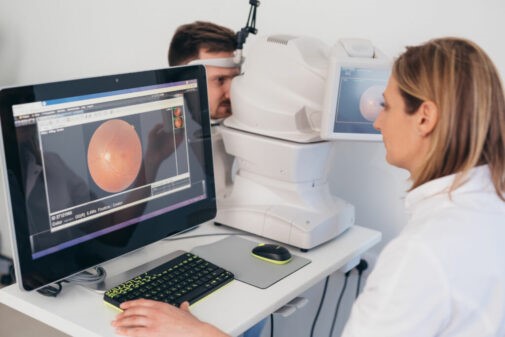How to Prevent Vision Loss Caused by Diabetes
 Diabetes is the leading cause of blindness in Americans 20-74 years old. Thankfully, 95% of vision loss caused by diabetes can be prevented by a routine diabetic eye exam. The American Diabetes Association suggests eye exams be done yearly.
Diabetes is the leading cause of blindness in Americans 20-74 years old. Thankfully, 95% of vision loss caused by diabetes can be prevented by a routine diabetic eye exam. The American Diabetes Association suggests eye exams be done yearly.
What is a diabetic eye exam? It is an eye exam where the doctor specifically focuses on the health of your retina and the integrity of the blood vessels in your eye by dilating your eyes to help see inside.
“Diabetes is a disease that affects the whole body. The eye is one of the parts where we can directly observe any changes or damage to the blood vessels,” says Dr. Ross Clair, optometrist at Aurora Health Care.
Two of the most common types of vision loss related to diabetes are:
Macular edema is when there is swelling in part of the retina. The signs are:
- Blurry vision
- Vision that gets worse over time
- Objects look wavy, especially when you look straight ahead
- Objects look like they’re different sizes if you look out of one eye and then the other
- Colors look dull or faded
Retinopathy is damage to the blood vessels of the retina. The signs are:
- Cloudy vision
- Trouble seeing at night
- Seeing double
- Blurry vision in only one eye
- Redness or pain in your eye
- Seeing floaters or spots
- Loss of peripheral vision
Eye exams catch problems early and prompt care can prevent or reverse loss of eyesight. It is important for you to keep your eyes healthy by:
- Scheduling yearly eye exams.
- Asking your eye doctor to send your eye exam results to your doctor who handles your diabetes.
- Keeping your blood sugar, blood pressure and cholesterol under control.
- Taking your medications as prescribed.
- Quitting smoking.
Getting a diabetic eye exam is important because diabetes can harm your eyesight without warning.
“Having an annual dilated eye exam allows the doctor to see if there is damage being done to the blood vessels of the eye,” emphasizes Dr. Clair. “There are times when patients see clearly and have no complaints, but when I look at the retina, I can see leakages from the blood vessels. This alerts us to communicate with your primary care physician or APC so they can decide the best course of action to lower your blood sugars.”
Article contributed by: Amy Werdin
Tags: #blindness, #diabetes, #eyeexam, #parishnurse, #visionloss

Comments are closed here.